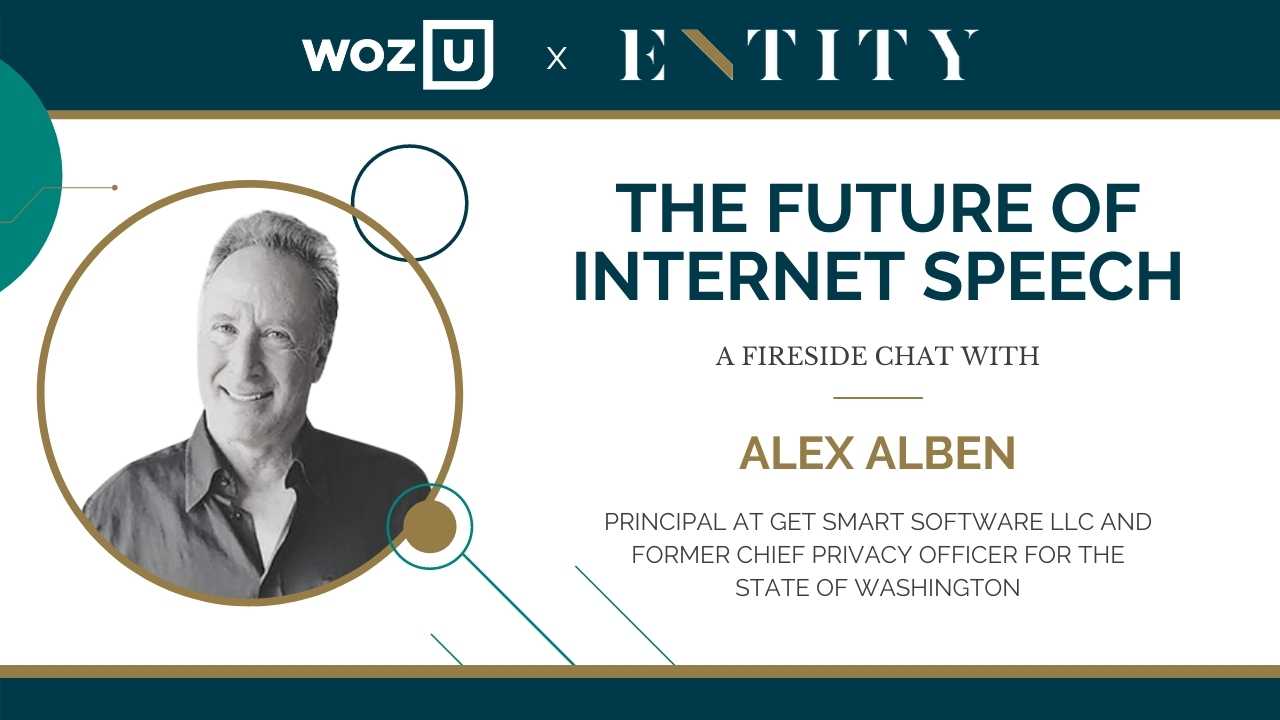Like Pandora’s box, the Internet opened the door to limitless ways of communicating ideas and free speech — both good and bad. But what happens when misinformation begins to impact larger societal issues or when hate speech permeates social media? Who has the right to control what’s posted online? Should more regulations be implemented?
At a Fireside Chat hosted by WOZ and ENTITY Academy, Alex Alben spoke about the future of Internet speech, with Fox 11 News Reporter and NBC Correspondent Stephanie Stanton guiding discussion as moderator. Alben explained the role big technology plays in communicating ideas and free speech, as well as the future of Internet speech.
Who is Alex Alben?
Alben is a UCLA Lecturer in Law, teaching privacy law and Internet law. He also served as Washington State’s Chief Privacy Officer from 2015 to 2019. Alben has worked on consumer privacy legislation, including the implementation of The California Consumer Privacy Act.
He received both a graduate degree and a law degree from Stanford University. He also has more than 20 years of experience in the area, with work featured in the Seattle “University Law Review,” “Stanford Law & Policy Review,” and “The Seattle Times.”
How the Internet Made the Average Joe a News Source
During the Fireside Chat, Alben noted that one of the primary ways in which the Internet changed communication technology is that it eliminated high barriers for a large audience.
Prior to its creation and implementation, communication technology required certain standards to be met — finances to cover printing costs, a television or broadcasting license, and formal education in journalism or other related areas.
The Internet, however, gives the average Joe the ability to become a publisher. It not only allows for individuals to communicate with one another, but it also opens accessibility for the average Joe to have thousands— or even millions— of readers.
Blogs and influencer accounts, therefore, are challenging traditional news platforms like tv, radio, and print publications.
According to a 2021 report from the Pew Research Center, more people are turning to online content for news sources. About 86% of Americans said they get their news from digital devices instead of television (68%) or radio (50%). Furthermore, 52% of Americans said digital platforms were their preferred method of receiving the news.
Social media also provides another digital platform for communicating ideas and opinions, both formally and informally.
Even though tech companies such as Twitter and Facebook were both founded in the last 20 years, millions of people use these sites daily. According to data gathered during Twitter’s fourth-quarter financial report, there are 192 million monetizable daily active users on the social media site. Meanwhile, Facebook reports 1.84 billion daily active users on average for December 2020.
Addressing Misinformation and Hate Speech
Over the last few years, the spread of misinformation and hate speech has turned some of the greatest treasures brought by the Internet into severe problems. Blogs and biased news sites started posting fake news. Social media sites brought together hate groups and extremist groups. Most recently, inaccurate claims of COVID-19 have created problems for people’s health and safety.
“There is a societal consensus that certain things, certain kinds of speech, are offensive and are out of bounds,” acknowledged Alben during the Fireside Chat.
When misinformation began to spread about the coronavirus, social media sites like Facebook began to ban misinformation and false claims about the vaccines and health guidelines.
Alben also provided some context as to why online speech isn’t heavily regulated by technology companies.
With so many users, it is very challenging for the big tech companies to have control over what is said, said Alben. Furthermore, Alben pointed to Section 230 as another reason why Internet speech is not commonly censored or regulated by technology companies.
Section 230 states, “No provider or user of an interactive computer service shall be treated as the publisher or speaker of any information provided by another information content provider.”
As a result, Section 230 provides a shield for technology companies and it is instead individual users that are seen as responsible (and held accountable) for what they post online.
The Future of Internet Speech
The future of Internet speech — and the Internet as a whole — carries many nuances and the issue can’t be resolved through a stark black and white approach. There are valid points to exerting more control over free speech, but the same can be said for keeping the Internet free from it. Heavy regulation by technology companies or the government could impose severe limitations on free speech online. However, issues like misinformation and hate speech need to be corrected.
Ultimately, big technology companies can play a role in limiting harmful misinformation but individuals also need to take personal responsibility with what is posted and shared online.
“It’s important for Internet users to be educated citizens,” said Alben.
Internet education and digital literacy are important areas that bring sense and personal accountability to online websites and social media.
Alben also reminded attendees during the Fireside Chat that they need to be mindful of privacy and the information shared online. Whether it’s creating an account on an app or posting a comment online, once that information is out then it’s out there forever.
Become a (cyber) security guard. Put your security training to work to take down cyberattacks, protecting your organization. Enroll with any of our learning delivery partners to learn the fundamental cybersecurity concepts to fortify networks with cutting-edge defense tools with the Cyber Security training program developed by WOZ.

Sophia Acevedo
Sophia Acevedo is a journalist based in Southern California. She is a 2020 graduate from California State University, Fullerton, and a proud Daily Titan alum.





